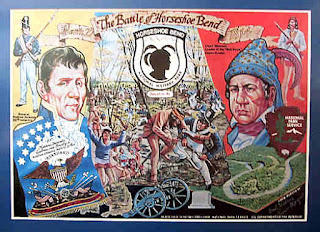Thus the United States were forced into a war which they had not provoked;---America took up arms in support of her rights, and for the preservation of her national honour, with a firm determination not lay them down until the object should be attained. Providence blessed our efforts, and our arms were crowned with the most brilliant triumphs over those of our enemy. The army and navy exhibited a noble rivalship of zeal, devotion, and glory. In the one Lawrence, Bainbridge, Decatur, Perry, McDonough, Porter; — in the other *Pike, Scott, Brown, Jackson, and many more, proved to the enemy, and to the world that we possessed resolution to defend our rights, and power to avenge our injuries. [Source]
 |
| *Portrait Of Zebulon Pike (Seen At Fort Pike, Louisiana) |
 |
| Jackson And Horseshoe Bend (Alabama) |










